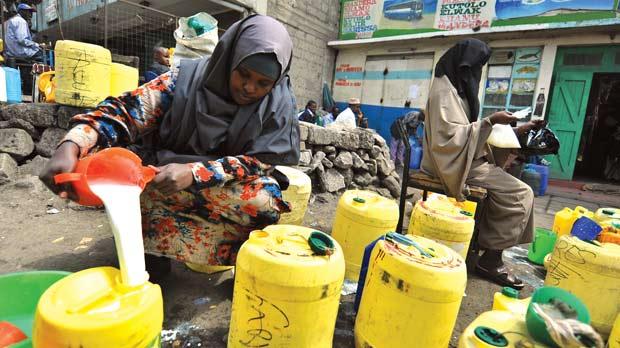In the sweltering heat of Isiolo County, a group of women are locked up in a room trying to earn a decent living.
The women numbering 25 and largely drawn from Tawakal Group are engaged in camel milk business which is gaining popularity not only in Isiolo town but far counties such as Nairobi, Naivasha and Nakuru for its health benefits.
Once the sole preserve of nomadic Somali and Middle East communities, camel milk, which is naturally semi-skimmed, three times as rich in vitamin C as cows’ milk and packed with antibodies, is increasingly being recognised for its health benefits by health conscious consumers.
In Nairobi, camel milk is now available in restaurants and supermarkets. For more adventurous foodies, camel milkshakes and camelcino (a cappuccino made with camel milk) can be found in some eateries.
”We get our supply from herders, some keeping the animals in neighbouring Samburu and Meru Counties. We preserve the commodity in the fridges before transporting them to the Nairobi market,” said the Chairlady of the group Dekha Adow.
One of the group’s supplier is Adan Abdi who rides to Shab Hills along the Isiolo-Meru border, a distance of 50km to collect the milk on daily basis.
”I wake up at 4.30 am every day to bring 100 litres of camel milk for the group. I make two trips and I am through with my work by 2 pm,” said Abdi.
The group also gets more supply from Mulango, 20 km west of Isiolo town and Archers Post in Samburu East.
”This is low season. It’s difficult to get more than 300 litres as the camels are in lactating period,” explained Ms Adow.
During the peak season, the women sell up to 3,000 litres of fresh milk to the Nairobi market.
At their cooling centre within a building the group owns, they also run a milk bar where they sale fresh, fermented and yoghurt milk to local customers as low as Sh 30 per cup.
”Each member has specific roles. Some work at the milk bar while others in the cold room. At night others take the milk to the stage where they are ferried to Nairobi by buses,” said the official.
They buy a litre at Sh 80 from the farmers and sell at Sh 150 and Sh 200 of the same quantity in Isiolo town and Nairobi respectively. ”We have an order from Eastleagh to supply them milk on daily basis. We get our money at the end of the month,” said Adow. Their clients are mostly refugees from Somalia who live in Nairobi.
”In Nairobi, the milk is sold in hotels and they also package them and sell in supermarkets,” she added.
But the group will be faced with dilemma when the supply of the milk increases. ”The population of our main customers (the Somalia refugees) is decreasing in Nairobi. A sizeable number have either moved out of the country or relocated to refugee camps,” said the group.
At the milk bar, the operator, Maimuna Mohammed said the group sells a small glass of milk at Sh 30 and the big glass at Sh 80. The varieties are fresh, fermented and yoghurt of various flavours.








